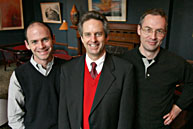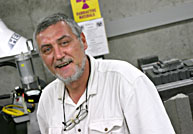Principal's prized professors
Although the four winners of the Principal's Prize for Excellence in Teaching have wildly different techniques and styles, they all share something in common: A willingness to invest time in their students and commitment to helping them become critical thinkers.
Brian Alters was pretty cheery when walking up McTavish to his office one morning. Some colleagues had passed by and called out "congratulations."
"I guess they heard about the snake getting loose," Alters thought, pleased that the missing serpent had been recovered the night before. But his mail revealed the real reason: he'd just been awarded the Principal's Prize for Excellence in Teaching.
The 2003 Principal's Prizes, awarded at the Founder's Day convocation last semester, went to Alters (Faculties of Education and Science) in the Associate Professor category, as well as to Fritz Buchinger (Physics) in the Faculty Lecturer category; John Abela (Psychology) in the Assistant Professor category; and Rex Brynen (Political Science) in the Full Professor category.

Left to right: John Abela, Brian Alters, Rex Brynen
Owen Egan
Principal Heather Munroe-Blum says she has been wowed over the last year by the dedication of the professors at McGill, and how they bring the benefit of their research and scholarship into the classroom, with creativity and flair. Teaching is the cornerstone of McGill, and she was impressed with the number of superb candidates.
Laura Wittebol, a graduate student in Agricultural Meteorology, was the Post-Graduate Student Society rep on the selection committee last year. She found it difficult to pick from the 20 or so professors on the short list, and looked to the personal and heartfelt references from other teachers and students. "I felt that teachers who challenged students in fun, interesting and unusual ways and made time to communicate with them were the best ones."
Alters, an instructor to future science teachers, never spends less than three to four hours designing a lecture, and will put in as many as 100 (Although Alters says when he starts something, he thinks, "it's going to take one-tenth the time it does.") Even preparing for delivery often takes time, including setting up elaborate props and "making sure things fly." His now-famous lecture given from a tank of water (in which he demonstrates buoyancy) took hours of scheming, from getting the architectural plans of the classroom so he could ensure that the floor could hold the added weight, to filling the tank using a hose running to the men's room. He's a certified scuba diver unafraid of enclosed spaces (crucial, since he's hidden in the tank while his TA asks the class the hypothetical question, 'how much air would it take to raise a person with seven pounds of weight around their waist?').
Most students were convinced that none of the options offered (Ziploc baggies of air) would work (the large one does). "They're positive one thing's going to happen and another does," Alters says. Showing a discrepant event first, then explaining to them how what happened was possible, makes for more effective teaching.
He renders the usual dramatic by supersizing an ordinary experiment. A hair dryer can keep a ping-pong ball aloft, not just directly above the air stream but aiming at an angle. Alters and his team applied the trick using a leaf blower and a beach ball, hovering the orb above the students in class.
For his religion and science course, Alters dusted off his police officer's uniform from his time as a cop in California. The students filed in to a classroom resonant with church music, a podium up front with a Bible on one side and a skull on the other. Alters arrives in his blues, reads from the King James and talks about "policing" the difference between religious fundamentalism and evolutionary science. A colourful way to drive home to his students that they may be called upon to respond morally and ethically to a child's confusion over the gap between their parents's beliefs and the school curriculum.
Alters often brainstorms with his TAs, coming up with wild ideas, weeding through what's possible, then considering the curriculum.
"A lot of profs may think it's overdramatic hype," Alters says, "but in my 101 courses there are rarely empty seats and the students don't need to be there."
"During Darwin's time, he and others used to go to lectures where there'd be hundreds of students piling in to see the wonders of chemistry," Alters says. "I can't stand when I leave a classroom and think I wouldn't have wanted to be there."
When John Abela started his PhD at the University of Pennsylvania, teaching was the aspect he was least interested in. But now, Abela says, "Teaching is my favourite part of my job at McGill."
His not-so-secret secret to motivating the students is to bring enthusiasm into the classroom, Abela says. "When the students ask 'why is that guy ranting around excitedly?' they'll start to wonder."
He teaches 160 students in the Deviations in Childhood Develop-ment course, which he's taught nine times in his four years at McGill. He strives to turn it into a seminar despite the large numbers. "I engage them, get them revved up."
A background in musical theatre helps Abela get the students's attention and encourage them in participating in active discussion in the class. He then takes the lead of the students in forming the course.
He often starts his classes with a video clip illustrating some aspect of childhood development or depression. "I help them see the relevance of it to their lives. It's something that affects people, it's not abstract." He also has an open door policy to his office, urging them to just drop by and say hi. "I tell them I want to get to know them, and I make myself not intimidating." It works. Feedback shows he's taken the apprehension out of the professor-student dynamic.
Abela's passion rubs off on the students. Many apply to do research with him at the Montreal Children's Hospital, where they take his lead and pour their hearts into their work.
Abela does longitudinal studies on adolescents's vulnerability to depression and the correlation to stress. This clinical work is where the bulk of Abela's teaching takes place.
Since not all adolescents who undergo stressful situations become depressed, Abela's team teases out the vulnerability factors (such as pessimistic styles of thinking) and tries to predict which ones will become depressed. Each student spends 25 hours with the parent and an equal amount of time with the adolescent.

Physics lecturer Fritz Buchinger
Owen Egan
Besides five PhD students, he supervises 12 honours undergraduate students and 15 volunteer students. "I offer opportunities to undergraduates that generally goes to graduate students," he says. "They're not just research assistants doing the grunt work."
He has faith in his undergraduates' abilities and puts a lot of time into creating seminars and projects for them, and selects them carefully for the clinical work. "I couldn't care less about GPA," Abela says, preferring to choose those who show strong interpersonal skills. The result? "Incredible teamwork."
"Most of the learning I do comes from the students," he says. After "years of being entrenched in my own viewpoint, the students are coming to me with a fresh perspective."
Physics lecturer Fritz Buchinger, a specialist in experimental nuclear physics, has more one-on-one time with students than most professors, thanks to being the director for the undergraduate laboratories. Instead of standing in large lecture halls, he runs labs for students recreating Rutherford's experiments with alpha rays and gold foil or Compton's scattering of photons.
Buchinger's lab space in the still-new Wong Building boasts a number of stations set up to determine the mass of electrons, mess with laser spectroscopy and measure soundwaves and gamma rays. In the corner a pile of lead bricks shield students from a radioactive source. It looks ominous, but Buchinger laughs, saying "the biggest danger is the lead falling on your feet."
There's always new research equipment coming in (a couple of years ago a radio telescope was installed on the Rutherford Building's roof) and experiments to oversee and match to students. Besides coordinating and organizing project labs, he also supervises honours theses.
For Buchinger the transmission of facts isn't the point of teaching, but rather how to challenge the students, get them interested and motivated. He encourages them to take an interactive approach to formulate problems with real world practical applications, and to figure out themselves the steps to take to solve them.
"Success depends on the time invested in the students," he says, adding, "You learn from your students, you never know what's new. It's good for my curiosity."
Buchinger's clearly proud of the experiments that his students designed, such as a machine set up with loudspeakers and drum skins to guage the quality of a drum's resonance. "They invent something you should have had a long time ago," he beams.
In his 20 plus years at McGill, Buchinger says that students now have broader interests. "I see more and more students who like to combine physics with something else, like a minor in philosophy." Because of the hours he spends with them, the students feel he knows them well. "I write 20 to 25 recommendation letters a year," he adds.
Political Scientist and Middle East specialist Rex Brynen says, "I'm lucky to be teaching inherently interesting material."
"The trick is to not make it boring, to show the students that what they study is a useful tool to make sense of the world, help them deal with it, understand it, change it."
He's been known to turn to the stars for inspiration. Or rather, to the starship Enterprise. Brynen has earned the title of Unindicted Co-conspirator of the Graduate Program in Exopolitics, due to his use of popular science fiction TV series to illustrate politics and negotiation. He applies analysis to shows from "Star Trek" to "Buffy the Vampire Slayer."
He says teaching the large 600-student classes is "a lot like doing Letterman, speaking directly to the audience, engaging with people."
In his smaller Peacebuilding and Post-Conflict Reconstruction course, students take part in the Brynania Simulation at the end of March. Participants assume the roles of states, organizations and political actors in a virtual world, making financial and military decisions and commands, mostly via email to "Control" (i.e. Brynen) over a week.
He explains at www.brynania.net that the simulation is intended to recreate many of the issues and challenges that confront real life decision-makers concerned with war-to-peace transitions. Participants (or teams of participants) assume the role of different parties (regional actors, selected external states, international organizations and NGOs).
Demonstrating the negotiations in a simulation is far more effective than lecturing, he says. "Students can't easily understand how grown-ups can mess up" in the real world of politics. But by working in the complex simulation environment, they experience the gamut of coordination difficulties and communication misunderstandings.
For those 10 days, Brynen is stuck to his computer, replying to emails that come fast and furious. "I enjoy doing it. Not always at 2:00 in the morning when I'm catching up on emails, but I enjoy it." he says.
For Brynen, the pay off for all his time spent comes from the students's future accomplishments. "Hardly a week goes by when I don't hear from a student who's gone on to work in [organizations such as] the UN or CIDA," he says. Just this week he received email photos from a student in Iraq. Others are in Bosnia, or with Medecins Sans Frontières or working on small arms disarmament in Africa.
Brynen comments on how lucky McGill is to have students from such diverse backgrounds, who are animated and engaged. "They're a joy to teach."
Coming next issue: Annual Educational Supplement
